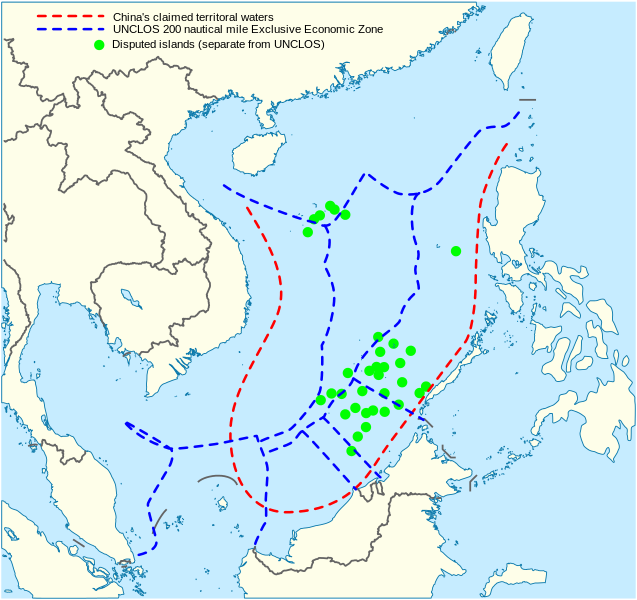By Merel Alstein
Tensions in the South and East China Seas are high and likely to keep on rising for some time, driven by two powerful factors: power (in the form of sovereignty over and influence in the region) and money (from the rich mineral deposits that lurk beneath the disputed waters). Incidents, such as the outcry over China’s recently announced Air Defence Identification Zone, have come thick and fast the last few years. One country’s historic right is another country’s attempt at annexation. Every new episode in turn prompts a wave of scholarly soul-searching as to the lawfulness of actions taken by the different countries and the ways that international law can, or cannot, help resolve the conflicts.
In order to help keep track of debate in blogs, journals, and newspapers on the international law aspects of the various disputes, we have created a debate map which indexes who has said what and when. It follows on from our previous maps on the use of force against Syria and the prosecution of heads of state and other high-profile individuals at the International Criminal Court. Blog posts in particular have a tendency to disappear off the page once they are a few days old, which often means that their contribution to the debate is lost. The debate maps reflect a belief that these transient pieces of analysis and commentary deserve to be remembered, both as a reflection of the zeitgeist and as important scholarly contributions in their own right.
To help readers make up their own minds about the disputes, the map also includes links to primary documents, such as the official positions of the countries involved and their submissions to the UN Commission on the Limits of the Continental Shelf.
One striking aspect of the map is how old some of the articles are, originating from the early 1970s. Controversies which seem new now actually go back some 40 years. In conflicts such as these, which cannot be understood without their history and where grievances often go back centuries, this awareness is key.
Another surprising feature is the uncertainty surrounding the legal basis of China’s claim to sovereignty over most of the South China Sea—its famous nine-dash line. Semi-official or unofficial statements by Chinese civil servants, or in one case by the Chinese Judge at the International Court of Justice, are seized on as indications of what China’s justifications are for its expansive maritime claims. A clearer official position, and more input from Chinese scholars, would significantly improve the debate.
Ultimately, the overlapping maritime claims and sovereignty disputes in the South and East China Seas are unlikely to be solved any time soon, and will keep commentators busy for years to come. We will keep the map up to date to facilitate and archive the debate. Your help is indispensable: please get in touch if you have any suggestions for improvements or for new blog posts and articles we can link to.
Merel Alstein is a Commissioning Editor for international law titles at Oxford University Press. She recently compiled a debate map on disputes in the South and East China Seas. Follow her on Twitter @merelalstein.
Oxford Public International Law is a comprehensive, single location providing integrated access across all of Oxford’s international law services. Oxford Reports on International Law, the Max Planck Encyclopedia of Public International Law, and Oxford Scholarly Authorities on International Law are ground-breaking online resources working to speed up research and provide easy access to authoritative content, essential for anyone working in international law.
Subscribe to the OUPblog via email or RSS.
Subscribe to only law articles on the OUPblog via email or RSS.
The post Sovereignty disputes in the South and East China Sea appeared first on OUPblog.

By John Louth and Merel Alstein
What is a state? We think we know but when we compare things that are (e.g. Monaco, Andorra, Liechtenstein) to things that are not (e.g. Scotland, Kosovo, Palestine) our understanding unravels. This is a core question of international law and the troubling thing is that the best experts in the subject wouldn’t give a consistent explanation for the differences between these examples.
The UN is the closest thing we have to a world government. It is founded on a legal document (The UN Charter), it has a Court to resolve disputes between members, it has a Parliament of states (the General Assembly), and crucially, unlike its predecessor the League of Nations, it can authorize collective enforcement of its will (via the Security Council). There are dozens of other international organizations getting on with regulating different aspects of the world’s behaviour, so how come in spite of this appearance of a legal order, international law seems incapable of addressing urgent problems of poverty, violence, and climate change? How come the powerful get away with breaking the law? Why does justice so often get trumped by expediency?

Maybe that’s not fair — our national governments suffer from these same failings too. They do some basic things well (international law does a great job co-ordinating postage and telecoms) but can’t seem to manage the big breakthroughs. Surely there is a difference though: we created the international system to improve on what our governments can achieve on their own. If it can’t do better, then what is the point?
Today more people than ever before are engaged with international law. Many are, as one would expect, learning and applying it, but an increasingly vocal proportion question its role, its effectiveness and even its very existence. If it is to fulfil its promise, international law needs to rise to the following challenges.
(1) Is it law or is it just about power?
International lawyers are tired of hearing this question but it isn’t addressed to them. It is addressed to the leaders who take part in a legal order yet subvert it at the same time. Every state sends and receives diplomats yet simultaneously carries out espionage. States choose to use law to enforce some obligations whilst insisting not to be bound by others. The late great Sir Ian Brownlie used to say “if you doubt the reality of international law, have a look at my bank balance”, i.e. his clients (states) were paying him so they must believe it in. But that is just the problem — the very actors that Brownlie cited as proof of the reality of the law are the ones who can also make it seem like an optional extra, not a source of obligation.
(2) Who does it apply to?
Nowadays many of the entities regulated by so-called international law are not nations: corporations, international organizations, indigenous peoples, individuals, armed resistance groups. Cases at the International Criminal Court pit its Prosecutor (an individual acting on behalf of an international organization) against an individual criminal defendant. Then a group comes along who certainly seem to merit the protection of international law, such as the Guantanamo detainees, and we find that they don’t fit into any accepted legal category. If states can insist that only those laws they consent to can bind them, what about all of these other entities? Do they get more of a say in the content and application of the law? Should there be gaps in protection from human rights abuses?
(3) Where does it reach?
This follows from the last question. International law claims to reach directly into domestic legal systems; treaties apply to situations and places that nobody ever expected when they were first agreed. Then we have the increased use of outer space and the virtual arena of cyber space to contend with. Will these develop as adaptations of international law and if so would that not begin to stretch “international law” to the point where it is so diverse as to be meaningless?
(4) Are we expecting too much from a legal system?
International law can only move forward when there is a political consensus that it should. In the absence of political will, it is impossible to subject new areas to international law or to increase its reach. It is hard to square this compromising approach with international law’s progressive and at times utopian spirit. The planned recognition of Palestine as a state is a good illustration of the pragmatic dilemma: the legal order is advanced (by recognizing a new state) whilst also undermined (by restricting what statehood means).
(5) How can we know the content of international law?
The two primary sources of international law are custom and treaties. Whilst nothing involving lawyers is ever clear cut, treaties are vastly easier to engage with than custom, the exact nature of which remains shrouded in mystery. How customary law is formed and who is bound by it are matters that are crying out for authoritative resolution. For international law to be taken more seriously it is vital that the processes and content of custom are clarified and made available to all those who might use it or be affected by it.
Scholarly legal publishing has its part to play. We cannot of course makes statesmen and women take their obligations more seriously nor put in place the economic prosperity in which ideas of justice and fairness have a better chance of taking root. We can however nurture scholarship which looks to clarify the nature, content, and scope of international law.
John Louth is editor-in-chief of academic law books, journals and online, and head of Oxford University Press’ US law office. Merel Alstein is commissioning editor for books in the area of international law.
Subscribe to the OUPblog via email or RSS.
Subscribe to only law and politics articles on the OUPblog via email or RSS.
View more about The Charter of the United Nations: A Commentary on the 

Image credit: School of Law. Photo by SeanPavonePhoto, iStockphoto.





